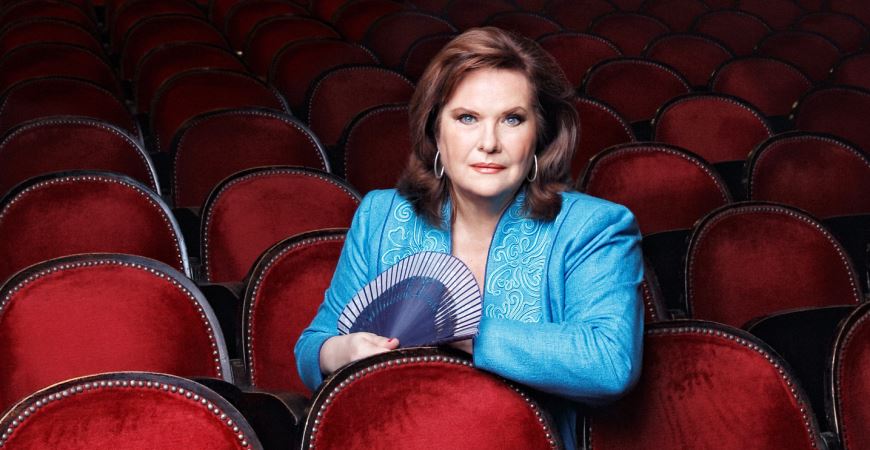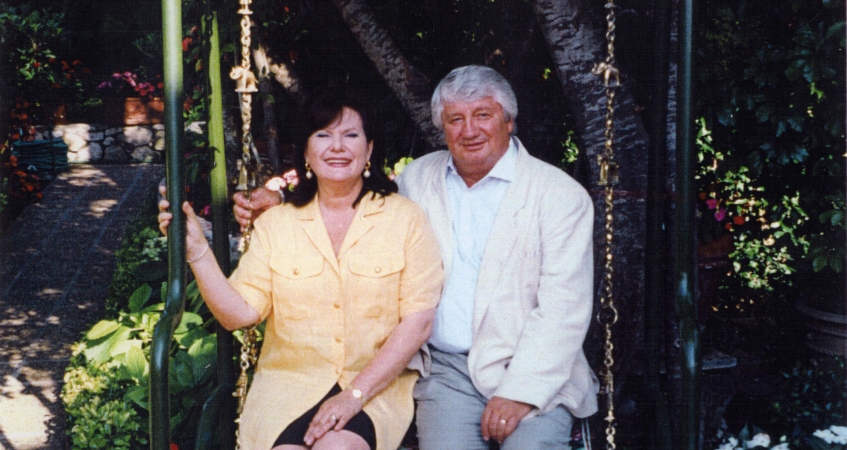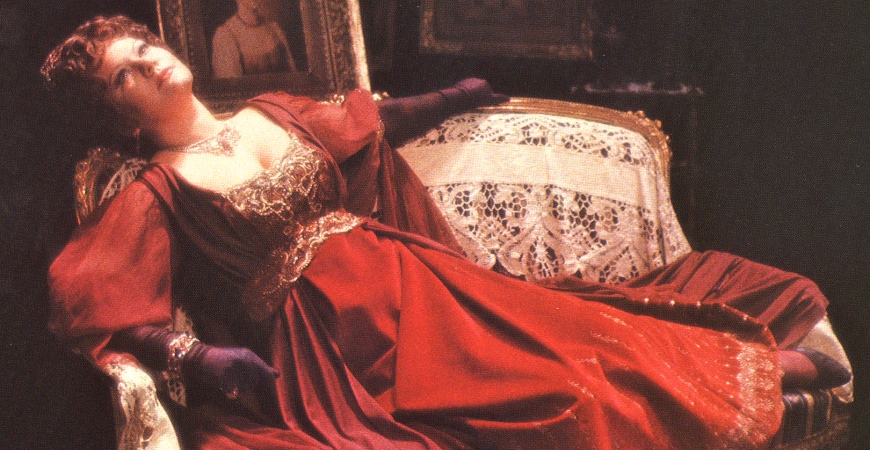“Vissi d’arte, vissi d’amore”
Éva Marton, the legendary Hungarian opera singer celebrates her 75th birthday. The Liszt Academy greets the dramatic soprano and professor emeritus with an oeuvre exhibition and a podium discussion. This article is written by András Batta.
A number of stories connect me with Éva Marton. Some of them may be personal, others are official and naturally there are the stories linked with opera. Due to the schemes of fate I was privileged to observe the phoenix flight of her life, and climbing the steps of age I may have become more competent to see and understand more and more of the truly great story that is behind the Marton-legend.

Éva Marton (Photo: László Emmer)
It was exactly thirty-nine years ago when I first knocked on the door to her dressing room in the Staatsoper in Vienna after a Tannhäuser as I recollect. She performed Elizabeth then and there she played the role, merely a few times. During the preceding two years she had sung it in Bayreuth, moreover this time it took place along an unusual concept in the history of the Festival, as she was embodying in a single play both of the female ideals of the restless male protagonist: Venus and Elizabeth, to the utmost joy of Wolfgang, Wagner’s grandchild. Elsa from Lohengrin also came extremely close to get realized on the Green Hill of Bayreuth, it was planned for 1979, nevertheless the role went to Karen Armstrong eventually, the would be wife of Bayreuth’s top director Friedrich Götz.
Such is life at the opera on the very top as well. Of course, as a scholarship student in Vienna during the spring of 1979, of such things I was not aware in the least. I was simply proud that in the gorgeous cast of the Staatsoper, that I went to enjoy nearly every day, I found the name of a Hungarian as the protagonist. Éva, who by that time was behind successful appearances in the great German opera houses, even in the Met and the Scala, dealt kindly with the unknown young man and even gave an autograph.
This was how my story started with her. A couple of years later, a friend of mine a violinist at the Vienna Philharmonics, called my attention to a fantastic Turandot just in the stage of rehearsals whose protagonist’s role would be sung by Éva Marton, something that both as a Hungarian and an opera enthusiast I was not to miss by any means. It was 1983 then, not that trouble-free to travel even as far as Vienna.
As such, we combined the premiere with a sightseeing vacation. It was an awe-inspiring experience of a life-long effect. The performance belonged to the astonishing class of operatic renditions during which one keeps pinching oneself to check whether all what is taking place is reality, or one has become a participant in a sort of virtual reality of perfect Gesamtkunstwerk, what this was without question, Lorin Maazel conducting, directed by Harold Prince, accompanied by Carreras and Katia Ricciarelli and the very best opera orchestra and choir in the world. Yet even all of this was topped off by Éva, by her queen like stature and manner, the tension in her being motionless, the overwhelming power of her voice, and as I had said it already to my wife, her blinding laser-light that irradiated the whole band. Meanwhile she was able to sing humanly also demonstrating the frailty in the Turandot role.

Éva Marton and her husband, dr. Zoltán Marton
Turandot by Marton was the greatest operatic sensation of the season, and this role with the astonishing success of its Vienna performance opened wide the remaining doors for Éva to the club whose members have turned new pages in the universal history of the opera. Fortunately the Vienna performances have been preserved in private and official recordings, therefore it is possible to re-live their miracle today, even if not first hand. As Éva referred to it later, Turandot’s role, which she compared to the 100 meter flat-race because of its conciseness and superhuman complicatedness, was tailored to her like a pair of gloves on one’s hands.
Later on, when I became friends with Éva and Zoltán her husband, and we were often talking about their joint career and her roles, I started pondering how her character matched those operatic roles in which superhuman beings consummate their fate by becoming human. The iceberg has melted, the armour has fallen off the soul – how well such roles fitted Éva. What strange concord of the solitude of the chosen one and the love for community (family, band, the human sphere) has been created in her character. Turandot, Brünnhilde, the Empress, and for some reason Die Färberin in Die Frau one Schatten are not merely stage roles, they are life roles as well.
A theatrical stage performing genius like Éva Marton lives her life in a dramatic manner. Tension between the opposites, the ability to change and the struggle to achieve catharsis, have been part of her throughout her career. Her childhood took place in the ‘Franz Stadt’ quarter of the city in a modest commoner family with a number of children, immediately after WWII. and around the beginning of the fifties. Such are not exactly inspiring conditions for a future international career. Yet, free access to culture was provided to this tiny, unique and very curious human being who enrolled at music school by herself, and took public library books home by the dozens, and was reading everything including the literature for adults. Belles-lettres provided her the nourishment of what she had been predestined to pursue. While her voice was changing she took to volleyball on a pretty high level. Then again: singing at the Liszt Academy. At the first attempt admittance was denied. Her mother starts hoping that she would be looking for some more civilian occupation, but to no avail. The devil keeps spurring her on to give another try to the entrance exam. This time success is assured. Bitter years at the Academy, shackles, being subjected to prejudices, then the bitter climbing on the ladder of success in the State Opera. The cage is too narrow for the phoenix. She will fly out to the free world only in 1972, even then it is a near miracle, with husband and child, being poor but happy.
We must make a brief stop here in the story. Just like in some romantic operas the soprano and the tenor fall in love with each other right in the first act. This time the tenor is a surgeon Dr. Zoltán Marton. What a moving story: a young female vocal artist with a temporary ailment is knocking on the door of the doctor on duty who has just left school, on a night in July. The love at first sight, has endured 55 years up to today. Union is not merely restricted to their matrimonial relationship, their calling has become one and the same as well. From the very outset it was Zoltán who served as Éva’s manager, despite of not even being aware of what it means to be the manager of a female vocalist. Similarly to Éva, Zoltán is a born talent also and each of them became rather quickly professional in their respective field. The young doctor understood that existing behind the iron curtain cannot offer enough opportunity for the order of talents his wife possessed (‘the antlers of the magic deer cannot pass through the entrance’) and his boldness, courage, ambition – all of them a must for an international career - got spurred instinctively. Zoltán understood even contending the opinions of serious opera professionals, when and what Éva should sing, where she should perform and how she could arrive at the great opera theatres. Needless to say, he was also aware of the genuine value attached to the process both prestige and finance wise. It was Zoltán who drew the map, who prepared the way, who built up the Marton legend. Now, already eighty years old he is creating the Marton memorial. Éva’s art is immortal, but the gate to immortality was opened before her by Zoltán. They are truly a extraordinary duet. Zoltán promised to get down to writing their story one day. The title would be “I was a Soldier of the Empress” – international opera life and Éva in it as perceived by him. It should become a bestseller.
They left Hungary in 1972 and Éva got contracted by the Frankfurt Opera recommended by its music director of the time Christoph von Dohnányi. Cleverly, they did not emigrate; they merely went to work abroad. (Zoltán laid down his talent enriching the German medical services as a surgeon, meanwhile he also took care and managed Éva’s affairs.) In such a setup they were not obliged to sever their Hungarian relations. Already in 1973 she was singing the female protagonist of Verdi’s Attila on Margaret Island, then in 1977, by this time with an international reputation, Tosca in the Erkel Theatre . During the 1970’s and 80’s a number of LP-s were recorded in Budapest with Hungaroton in a period which marked the emerging and golden age of the phonograph company.
Nevertheless it was abroad where her prime yield took place. Her repertoire, her performances both in space and time and excellence render her as one of the few 20th century vocalists who have left behind an encyclopaedic oeuvre. She joined the international front-rank with Puccini roles, especially the great dramas. Tosca was one of the most sought after, then one of the greatest Turandots of all times, and from the very start her appearance in Manon’s role is unforgettable. The opera heroines of Richard Strauss became one of her specialities. Salome, all three female protagonists in Electra, Ariadne. Empress and The Dyer’s Wife in Die Frau ohne Schatten. She also sang the title role of the little known Strauss opera: Helena of Egypt. With the exception of Senta in The Flying Dutchman, within her vocal range she appeared in the roles of all major Wagnerian female characters. Sometimes she performed multiple roles in one piece (Elizabeth/ Venus, Elza/ Ortrud, Sieglinde/Brünnhilde). Her Verdi repertoire was also colossal (Odabella, Alice at the beginnings of her career, then both Leonoras, Aida, Amelia, Elizabeth, Desdemona). Practically she sang all the significant roles of verismo. She adored Bartók’s Bluebeard, and of course Judith in it, whom she took to triumph (in Hungarian!) for the first time at the Scala. Around the end of her vocal career she put on the costume of Gertrudis in the film Bánk bán by Csaba Káel and Vilmos Zsigmond. Similarly to one of her beloved conductors, Sir George Solti she was solicitous about the Hungarian musical heritage – ‘of what she was shaped’ – and it was a priority for her to demonstrate these treasures under the radiance of her own success to the international audience that was hardly familiar with them. In the top period of her popularity, she was happy to sing the folk song ‘On this Side of the Tisza, on that Side of the Danube’ in a number of German and Austrian television interviews, eliciting emotional response.

Éva Marton as Fedora, 1980, Zürich
In retrospect, Éva Marton’s career provides little surprise at the couple’s decision of final return to Hungary at the beginning of the new millennium. As I put it once: the magic deer although her antlers could still hardly pass through the gate, meekly let herself put before the sleigh. The sleigh got populated by young singers, and the magic deer started pulling and pushing the carriage of the young talents with touching concern. To put it simply, Éva Marton became a professor at the Liszt Academy, which rounds off our own story too, as it was me who offered Éva to head the vocal department of the Liszt Academy. And behold, the world renowned prima donna, under whose sight or if confronted by her rigorous opinion, many representatives of the top echelon fell their eyes, became one in the line of teachers – and just like in one of her late Wagner roles as Kundry – she started to serve the future. With her entrance, not unlike in the Spring scene of Die Walküre, the air of international high-altitudes started to stream in, at times in the shape of a hurricane, and an artists’ workshop that provides a model for the future operation of the Liszt Academy has been constructed.
The international Singers Competition bearing the hallmark and fastidiousness of Éva Marton is tightly associated to the Liszt Academy. It was a cherished dream of Zoltán and mine for a long time, but took shape only a couple of years ago. The proof of its success is the great public interest besides the discovery of brilliant young talents, and the fact that it is going to be organized for the third time in a short interval. It has also become part of the ‘Éva Marton brand’, leaving its conspicuous mark on the image of Hungary.
Around the last stages of our mutual work I became a chronicler of the Martons and a biographical book of interviews, got published as a joint effort of the three of us – Éva Marton: The Celestial Voice (Helikon Kiadó, 2014). However, the book can provide merely a bird’s eye perspective of the heights and depths of the oeuvre. Ever since, recordings from the Marton Archives have been played in a thematic arrangement by Zoltán in the radio program ‘Lemezelő’ by Zsolt Madarász. While committing these lines to the paper, I am listening to the live recording of Tosca praying, a 1984 performance that took place in the Houston Opera. It is impeccable perfection itself. One wonders how it is possible to express the depth of sadness, purity, and prayer, by the tone and the rhetoric of singing, something that cannot be conveyed verbally? The secret belongs to the great performing artist, an inexplicable alloy of endowment and experience. It is a gift from the Muses.
„Vissi d’arte, vissi d’amore...” In the given situation of the opera it is a sad credo. However, its other aspect is the proud Ars Poetica of a vocal artist. Its validity is not restricted to the past, but it is also a blueprint for the future. Dear Éva, I wish that you pass on this message unrelentingly with your entire being and your activity. Coming generations are expecting it, and I believe they will comprehend it. God bless you and Zoltán.


